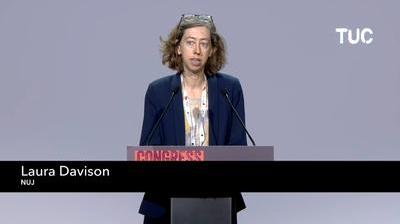TUC Congress 2025: solidarity with journalists in Gaza and worldwide
TUC Congress unanimously passed an NUJ motion calling on delegates to continue standing in solidarity with journalists globally and condemn attacks against media workers.
Delegates also supported, in that motion, specific protections under international law, namely a UN convention on the safety and independence of journalists and other media professionals.
This year’s Congress took place in Brighton from 7-10 September, with the NUJ moving or supporting several motions, including to protect the rights of our members against the threats posed by AI.
Safety of international journalists

Laura Davison, NUJ general secretary, presented motion 72, ‘International solidarity with journalists’, on Wednesday. She opened her speech by referencing International Federation of Journalists (IFJ) figures, which show at least 235 journalists and media workers have been killed since 7 October 2023, 221 of them Palestinian.
Davison said:
“Let that sink in. That’s 235 workers killed doing their job, 235 journalists working on behalf of the world to tell us what is happening - our eyes and ears on the ground.
“According to Article 79 of the Geneva Convention, journalists in war zones must be treated as civilians and protected as such. These deaths did not happen by accident. Journalists are being targeted and killed by Israeli forces. The IFJ holds a list. On 10 August, the world was sickened by a targeted attack which killed a team of five Al Jazeera colleagues and a freelance photojournalist.
“On 25 August Israeli airstrikes on Nasser hospital killed five journalists and media workers for Reuters, Associated Press, NBC News, Middle East Eye. We’re talking about journalists working in the most horrendous conditions, many as freelances, compounding their vulnerability.
“Young journalists, women journalists, a pregnant woman journalist, trades unionists. Alongside them, their families, civilians, workers in other trades - your trades. This is the deadliest time for journalists in recorded history.”
The NUJ responded to the attacks on al-Shifa and Nasser hospitals in August by condemning the killings and repeating calls for global action to stop the bloodshed and end the Israeli government’s war on journalism and truth.
NUJ members also took action, organising vigils, rallies and protests in towns and cities spanning the UK, Ireland and Continental Europe. They responded practically, donating to the IFJ’s Safety Fund - a lifeline to help journalists around the world, wherever they face violence.
In her speech, Davison, laid out the NUJ’s specific demands, which include:
- An investigation by the International Criminal Court (ICC) into the targeting of journalists by Israeli forces and for Israeli authorities to be held accountable.
- Press freedom for Gaza - international journalists must be allowed access to undertake work alongside their Palestinian colleagues to whom we owe an enormous debt.
- The adoption of a binding UN Convention on the safety and independence of journalists and other media professionals.
She added: “We do not accept the killing of journalists, wherever it takes place. We do not accept the targeting and murder of journalists. We do not accept impunity. We do not accept that death is a price to be paid for doing your job.”
Davison also spoke more broadly about journalists’ safety, citing data showing that more than 600 journalists have been killed around the world in the last six years, with nine in 10 cases still unpunished. She highlighted the fact that hundreds more are imprisoned, detained, attacked, beaten, harassed and threatened on a daily basis, with digital safety also a growing concern.
The NUJ’s online Journalists' Safety Tracker allows journalists to capture and report the abuse they encounter as part of their work. It can be used by members and non-members, freelance journalists and those directly employed.
The union Prospect seconded the NUJ’s motion showing solidarity with journalists globally. Alice Black, Prospect NEC deputy vice-president, said:
“The pictures we’ve seen from Gaza in the media and on our TV screens are horrendous and they bring home the huge suffering being inflicted. We only know as much as we do about these horrors because of the brave work of journalists on the ground, who are often risking their own lives in their dedication to report the truth in unimaginable conditions. Records from the IFJ show at least 122 media professionals were killed in 2024.
“In light of these awful killings and ongoing dangers to reporters in Gaza, now, more than ever, we must stand in solidarity with these journalists. This solidarity must also extend to journalists worldwide, whether in Iran, Ukraine, or elsewhere, as well as to women journalists working under oppressive regimes.”
